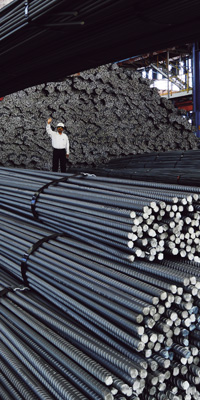 |
|
|
Directors' Report
Business Results

The year witnessed the best ever crude steel
production by the Company at 5.05 million tonnes.
Jamshedpur became the first plant in India to
produce more than 5 million tonnes of crude steel. |
The Company achieved the best ever sales turnover and
profitability during the year under review. A robust Indian
economy, firm steel prices, higher volumes and several
improvement initiatives contributed to the record performance.
Finished steel sales were higher by 11.33% at 4.51 million tonnes
over the previous year. Export turnover was lower by about
5% due to lower volumes. Average price realisation improved
mainly due to higher prices of hot rolled coils/sheets. Operating
profit was higher by over Rs. 1,000 crores at Rs. 6,973 crores
(2005-06: Rs. 5,938 crores), an increase of 17% over the previous year. Net interest charges were higher at Rs. 174 crores (2005-06: Rs. 125
crores), due to additional borrowings for the Company’s domestic
expansion programs and funding Company’s contribution for
financing the acquisition of Corus Group plc. After providing
for Rs. 819 crores for depreciation (2005-06: Rs. 775 crores) and
Rs. 152 crores towards employee separation scheme (2005-06: Rs. 53
crores), the profit before tax rose by 20% to Rs. 6,262 crores (2005-06:
Rs. 5,240 crores). Net Profit after taxes was higher at Rs. 4,222 crores
(2005-06: Rs. 3,506 crores), an increase of 20% compared to the
previous year.
The record financial results would not have been possible without
a matching performance by the operating departments including
the raw materials division. The year witnessed the best ever
crude steel production by the Company at 5.05 million tonnes,
an increase of 6.7% over the previous year. Jamshedpur Plant
became the first plant in India to produce more than 5 million
tonnes of crude steel in a year. The upgraded “G” Blast Furnace
produced over 2 million tonnes of hot metal, as against its rated
capacity of 1.8 million tonnes. Among the Finishing Mills, the
output at the Cold Rolling Mill and the Hot Strip Mill exceeded
their rated capacities. The all-round increase in production was
backed by improvements in operating practices and productivity resulting in a reduction in consumption of raw materials, energy,
refractories, etc.
The Company’s Collieries, for the first time, produced 1.9 million
tonnes of clean coal at a reduced level of ash content, which
has contributed significantly in substituting the more expensive
imported low ash coal. A modern beneficiation plant for iron ore
fines has been set up to reduce the alumina content in iron ore.
Pursuant to the Accounting Standard AS-21 issued by the
Institute of Chartered Accountants of India, consolidated financial
statements presented by the Company includes financial
information of its subsidiaries. The Company has made an
application to the Government of India seeking exemption under
Section 212(8) of the Companies Act, 1956 from attaching the
Balance Sheet, Profit and Loss Account and other documents of
the subsidiary companies to the Balance Sheet of the Company.
The Company will make available these documents / details upon
request by any member of the Company.
Dividend
The Board, for the year ended 31st March, 2007 has recommended
a dividend @ 130% (Rs. 13 per share) and a special dividend @ 25%
(Rs. 2.50 per share), subject to the approval of the shareholders
at the Annual General Meeting. The dividend will be paid on
608,972,856 Ordinary Shares at Rs. 15.50 per share (including
special dividend) (2005-06 : on 553,472,856 Ordinary Shares at
Rs. 13 per share). The dividend pay out works out to 26.15%
(2005-06 : 23.40%).
Acquisition of Corus Group plc, UK
Tata Steel’s investment in Corus Group plc is consistent with
the Company’s stated objective of growth and globalisation.
In keeping with its vision of becoming a truly global player and
creating a 50 million tonne steel capacity by 2015, through both
organic and inorganic growth, the Company had been examining
various opportunities. The process started with the acquisition
of NatSteel Asia Pte. Ltd. (Singapore) in 2005, and Tata Steel
(Thailand) Public Co. Ltd. (erstwhile Millennium Steel) in 2006, the
planned brownfield expansion in Jamshedpur and the long-term
greenfield projects in Orissa, Chhattisgarh and Jharkhand.
In October 2006, the Company submitted a bid to acquire the
UK based steel making company viz. Corus Group plc (Corus).
The acquisition was completed on 2nd April, 2007 at a price of 608 pence per ordinary share in cash for a net consideration of
USD 12.9 billion. Corus is a leading steel company with an annual
crude steel production of 18.3 million tonnes and revenues of USD
19.2 billion in 2006. Corus’ operations are organised into three
principal divisions; Strip Products, Long Products and Distribution
and Building Systems, with manufacturing facilities located in UK
and Netherlands. It holds a strong position in the automotive,
construction and packaging sectors in Europe.
With the acquisition, the Company has emerged as the sixth
largest steel manufacturer in the world. Tata Steel is the lowest
cost steel producer in the world, catering mainly to the domestic
market. The Company has a competitive advantage of captive
iron ore mines and collieries. On the other hand, Corus has
state-of-the-art plants located in the UK and Netherlands
producing mainly high end products, with a strong R & D
capabilities. The combination of these two entities will give
the Company access to highly developed and competitive
markets of Europe, a strong product portfolio and state-of-the-art technology in manufacturing. The Company also sees a
strong cultural fit with Corus, which is one of the key elements
for successful integration. The Company believes that there are
several areas where synergies are possible and is confident that
these benefits will start accruing from the current year itself.
Since the acquisition is effective from 2nd April 2007, the financial
results of Corus will get reflected in the consolidated financial
statements of the Company from the current year.
TOP |
|
 |